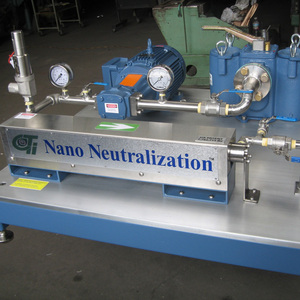North American soybean refinery to install CTi Nano Reactor

Photo: Cavitation Technologies Inc.
October 8, 2014
BY Ron Kotrba
Cavitation Technologies Inc. announced that its strategic partner and licensee of CTi’s vegetable oil refining technology Desmet Ballestra Group has entered into a sales agreement with a soybean oil refinery in North America. This newly built refinery will process approximately 500 tons of soybean oil. Desmet projects the new system will be fully installed and operational in 2015.
CTi anticipates approximately $350,000 in revenue from this sale.
“We are excited to have our first system sale in fiscal 2015,” said CTi President Igor Gorodnitsky. “We believe that fiscal 2015 will encompass a combination of the benefits our technology brings in vegetable oil refining, production of ethanol and biodiesel, water and petroleum treatment. Our invaluable relationships with our licensees, the Desmet Ballestra Group and GEA Westfalia, provide our company with very strong business partnership with global technology leaders.”
Advertisement
Founded in 2007, CTi designs and manufactures flow-through devices and systems and develops processing technologies for use in edible oil refining, renewable fuel production, expeditious petroleum upgrading, algal oil extraction, alcoholic beverage enhancement and water treatment. As an add-on to existing neutralization systems, the company’s patented Nano Neutralization Reactor System allows refiners to reduce processing costs and environmental impact while increasing the yield.
Advertisement
Related Stories
The USDA significantly increased its estimate for 2025-’26 soybean oil use in biofuel production in its latest World Agricultural Supply and Demand Estimates report, released July 11. The outlook for soybean production was revised down.
U.S. fuel ethanol capacity fell slightly in April, while biodiesel and renewable diesel capacity held steady, according to data released by the U.S. EIA on June 30. Feedstock consumption was down when compared to the previous month.
The U.S. EPA on July 8 hosted virtual public hearing to gather input on the agency’s recently released proposed rule to set 2026 and 2027 RFS RVOs. Members of the biofuel industry were among those to offer testimony during the event.
The USDA’s Risk Management Agency is implementing multiple changes to the Camelina pilot insurance program for the 2026 and succeeding crop years. The changes will expand coverage options and provide greater flexibility for producers.
The USDA’s National Agricultural Statistics Service on June 30 released its annual Acreage report, estimating that 83.4 million acres of soybeans have been planted in the U.S. this year, down 4% when compared to 2024.
Upcoming Events










